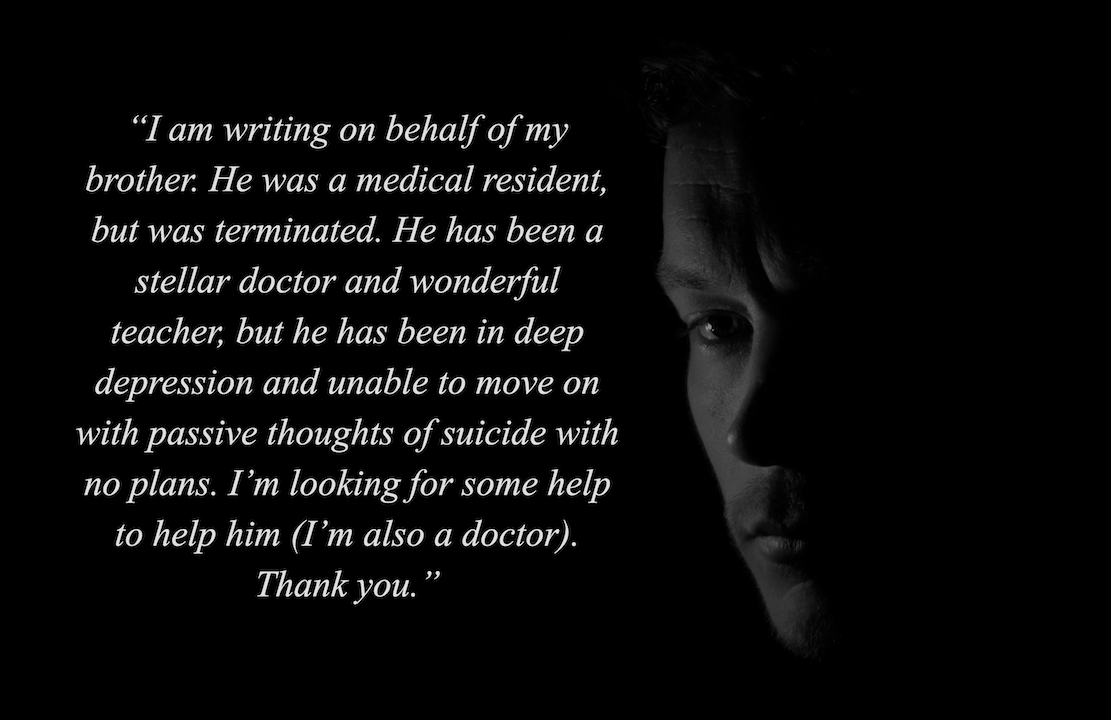I frequently receive letters requesting help for suicidal friends or family members in medicine.
“Dr. Wible, I am writing to you on behalf of my brother. He was a medical resident, but was terminated. He has been a stellar doctor and wonderful teacher, but has been in deep depression and unable to move on with passive thoughts of suicide with no plans. I’m looking for some help to help him (I’m also a doctor). Thank you.”
My best advice:
1. Open Communication – Physicians rarely feel safe to share their most vulnerable feelings—even with peers or family. Be nonjudgemental and willing listen as long as your brother wishes to talk. I’ve been on calls with a suicidal doctors for more three hours. Once they feel safe, doctors may talk for a long time. To understand why doctors feel suicidal, here’s a free audiobook of physician suicide survival stories and a documentary film on doctor suicide prevention.
2. Peer Support Group – I’ve led many support groups for suicidal physicians and the comfort that isolated physicians feel in a group of like-minded souls is immense. One surgeon shared that the support he received in our surgeon support group (for suicidal surgeons and surgeons who lost colleagues to suicide) has been more helpful than all his inpatient and outpatient psychiatry and therapy sessions. Note: Specialty-specific support groups are best. I suggest your brother join a group for residents who have left residency (not unusual as I know many). When I curate groups on Zoom, I aim for six to eight per session to maintain intimacy. Fewer is better.
3. Journaling – Releasing feelings into a journal is great way to process unbearable pain and anguish. Reading entries to family, friends, and therapists allows for more targeted interventions. I’ve led trauma writing retreats for physicians and they have been very beneficial (even for those who are just listening). I encourage a daily habit of journaling for all physicians. Gift your brother a journal. Encourage him to write and share passages with you.
4. Individual Therapy – Often physicians avoid seeking professional services due to career repercussions including discrimination by state licensing boards and hospital credentialing committees. To ensure 100% privacy and confidentiality, physicians may drive out of town/state to see therapists who use (non-discoverable) paper charts. Your brother should have a professional therapist/psychiatrist of his choice (much better than having one mandated by a board or randomly assigned by inpatient psychiatry). If his symptoms escalate, he can get the care he deserves with someone who knows him well.
5. Career Help – A physician’s identity is often wrapped up in their career. Loss of a career can feel like loss of one’s whole life. A physician’s motivation to pursue medicine may originate in childhood wounds. Gaining insight into one’s own wounds (pre-existing medicine) and trauma (during training and practice) can be helpful for healing and rerouting one’s career. Your brother is obviously a bright and motivated person, and he has so many options. I know students who have dropped out of medical school and/or residency who are happier now than ever. Several have launched their own healing centers or coaching practices—even without a medical license.
Need more help? Join a support group or live weekly retreat.















